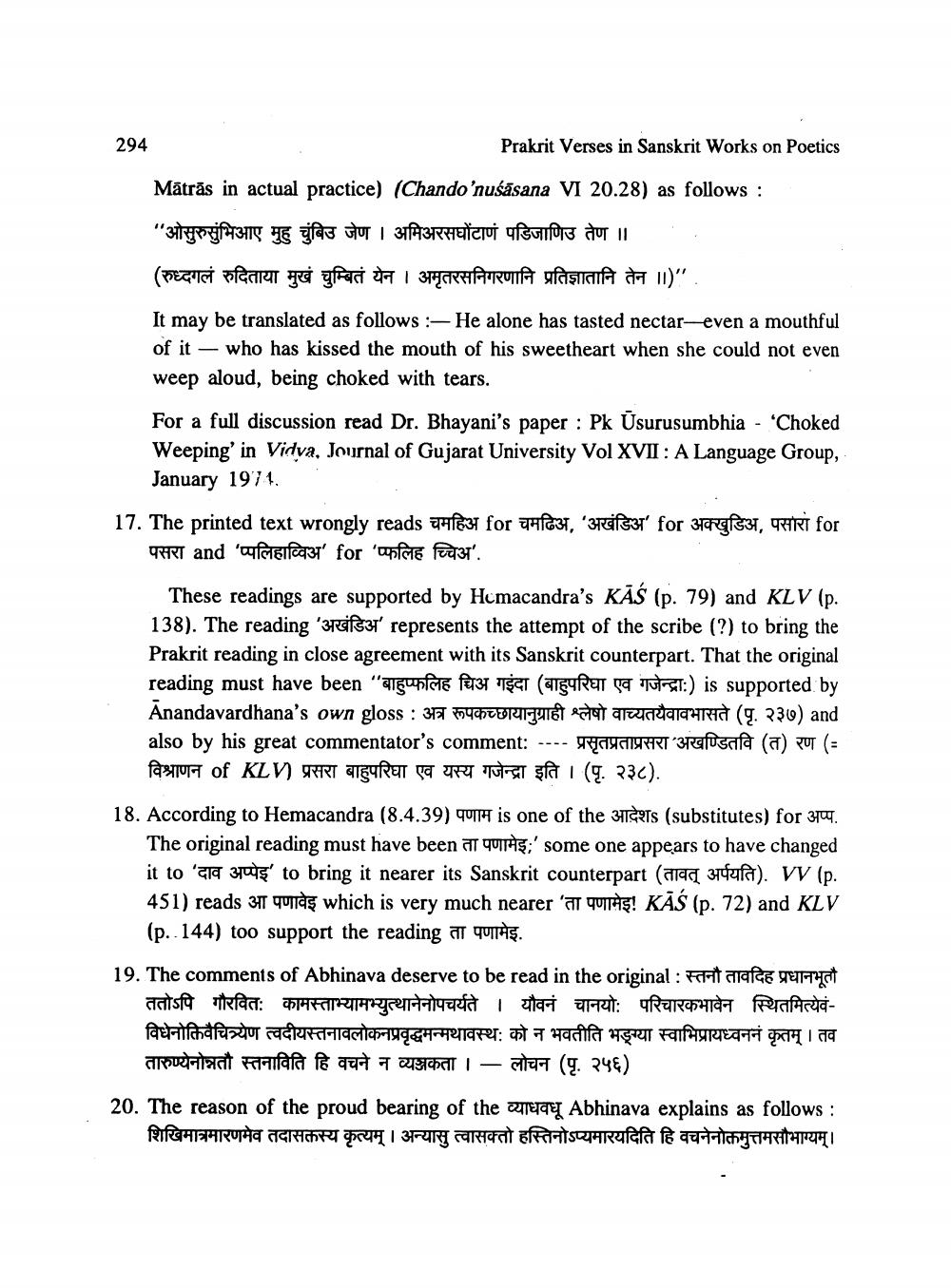________________
294
Prakrit Verses in Sanskrit Works on Poetics
Mātrās in actual practice) (Chando'nušāsana VI 20.28) as follows : "ओसुरुसुंभिआए मुहु चुंबिउ जेण । अमिअरसघोंटाणं पडिजाणिउ तेण ॥
(रुध्दगलं रुदिताया मुखं चुम्बितं येन । अमृतरसनिगरणानि प्रतिज्ञातानि तेन ।)" .
It may be translated as follows:- He alone has tasted nectar-even a mouthful of it - who has kissed the mouth of his sweetheart when she could not even weep aloud, being choked with tears.
For a full discussion read Dr. Bhayani's paper : Pk Usurusumbhia - 'Choked Weeping’ in Vidva, Journal of Gujarat University Vol XVII: A Language Group, January 1971..
17. The printed text wrongly reads चमहिअ for चमढिअ, 'अखंडिअ' for अक्खुडिअ, पसारा for
पसरा and 'प्पलिहाव्विअ' for 'प्फलिह च्चि'.
These readings are supported by Hemacandra's KĀŚ (p. 79) and KLV (p. 138). The reading 'अखंडिअ' represents the attempt of the scribe (?) to bring the Prakrit reading in close agreement with its Sanskrit counterpart. That the original reading must have been "बाहुप्फलिह चिअ गइंदा (बाहुपरिघा एव गजेन्द्रा:) is supported by Anandavardhana's own gloss : अत्र रूपकच्छायानुग्राही श्लेषो वाच्यतयैवावभासते (पृ. २३७) and also by his great commentator's comment: .... प्रसृतप्रताप्रसरा अखण्डितवि (त) रण (= विश्राणन of KLVप्रसरा बाहुपरिघा एव यस्य गजेन्द्रा इति । (प्र. २३८).
18. According to Hemacandra (8.4.39) पणाम is one of the आदेशs (substitutes) for अप्प.
The original reading must have been at quras; some one appears to have changed it to 'दाव अप्पेइ' to bring it nearer its Sanskrit counterpart (तावत् अर्पयति). VV (p. 451) reads 311 quide which is very much nearer 'at ulaş! KĀŚ (p. 72) and KLV (p..144) too support the reading ता पणामेइ.
19. The comments of Abhinava deserve to be read in the original : स्तनौ तावदिह प्रधानभूतौ
ततोऽपि गौरवित: कामस्ताभ्यामभ्युत्थानेनोपचर्यते । यौवनं चानयो: परिचारकभावेन स्थितमित्येवंविधेनोक्तिवैचित्र्येण त्वदीयस्तनावलोकनप्रवृद्धमन्मथावस्थ: को न भवतीति भङ्ग्या स्वाभिप्रायध्वननं कृतम् । तव तारुण्येनोन्नतौ स्तनाविति हि वचने न व्यञ्जकता । - लोचन (प्र. २५६)
20. The reason of the proud bearing of the ey Abhinava explains as follows :
शिखिमात्रमारणमेव तदासतस्य कृत्यम् । अन्यासु त्वासक्तो हस्तिनोऽप्यमारयदिति हि वचनेनोक्तमुत्तमसौभाग्यम्।




